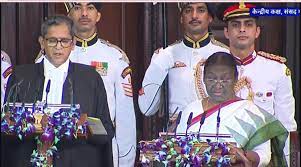Manas Dasgupta
NEW DELHI, July 25: Droupadi Murmu on Monday took oath as the 15th President of India at a ceremony in Parliament’s Central Hall in New Delhi. The first tribal and second woman to hold the country’s highest constitutional office, was administered the oath of office by Chief Justice of India NV Ramana. She succeeds Ram Nath Kovind, whose five-year term ended on Sunday.
In her maiden address as the president, Murmu said deliberations on global issues to be held under the leadership of India would help direct the G20 through the next decade. “In the coming months, India is going to host the G-20 Group under its chairmanship. In this grouping, twenty big countries of the world will brainstorm on global issues under the chairmanship of India,” President Murmu said.
“I am sure that the conclusions and policies that will emerge from this brainstorming in India will determine the direction of the coming decades,” she said. She also stated that the international community has high hopes from India in ensuring global economic stability, ease of supply chain, and peace.
India will hold the G20 presidency from December 1, 2022, and will convene the G20 leaders’ Summit next year for the first time. During its presidency of G20 or Group of Twenty, India will hold a large number of G20 events at different levels across the country, said Ministry of External Affairs (MEA) spokesperson Arindam Bagchi.
Bagchi said at a weekly media briefing that G20 Summit would be preceded by a large number of meetings – like ministerial meetings, working group meetings, and special initiatives that each country might do at various levels. “India will assume the presidency of G20 in December 2022. Apart from the Summit which we will hold next year whose dates are yet not finalized, a large number of G20 events at different levels will be organized across the country during our presidency. There is no need to speculate at this stage on these things,” he said. India has been a member of the G20 since its inception in 1999.
Outgoing President Ram Nath Kovind extended his best wishes to Droupadi Murmu. Odisha’s Rairangpur village, the native place of President Droupadi Murmu erupted in celebrations as she was sworn-in as the president. Born in a Santali tribal family on June 30, 1958 in Uparbeda village coming under Mayurbhanj district in Odisha, she had her education from Bhubaneswar and went on to work first as a junior assistant in the State Irrigation and Power Department from 1979 to 1983. After this short stint as a clerk, she became a teacher at Sri Aurobindo Integral Education Centre at Rairangpur till 1997.
President Murmu commenced her journey in the field of politics in 1997 by joining the BJP. She was first elected as the councillor of the Rairangpur Nagar Panchayat and then went on to become the chairperson of the same panchayat in 2000. Later, she also served as the national vice president of the BJP Scheduled Tribe Morcha. In 2015, Ms Murmu became the first woman governor of Jharkhand. She also became the first woman tribal leader from Odisha to be appointed as the governor of a state.
President Murmu devoted her life to serving society, empowering poor, downtrodden, and marginalized sections of society. She has rich administrative experience and an outstanding gubernatorial tenure in Jharkhand. President Murmu has made a special identity in public life by spreading awareness about education in tribal society and serving the public for a long time as a public representative.
Recently in an interview to a magazine, she had revealed that her name Droupadi, based on a character of the epic ‘Mahabharata’ was given by her school teacher. She had revealed that her Santhali name “Puti” was changed to Droupadi by a teacher in school.
“Droupadi was not my original name. It was given by my teacher who hailed from another district, not from my native Mayurbhanj,” she had said. Teachers in the tribal-dominated Mayurbhanj district used to travel from either Balasore or Cuttack in the 1960s.
“The teacher did not like my previous name and changed it for good,” she said when asked how she got her name uncommon among the tribals. She stated that names do not die in Santhali culture. “If a girl is born, she takes the name of her grandmother, while a son carries grandfather’s nomenclature,” she said.
Droupadi Murmu, who had the surname of Tudu in schools and colleges, started using the title Murmu after she married Shyam Charan Tudu, a bank officer.
Much before getting elected to the country’s highest Constitutional post, Murmu had made her views clear on the reservation for women in politics. “There must be reservation for women in politics dominated by men. The political parties can change this situation as they choose candidates and distribute tickets to contest elections,” she had said. She also said women should focus on “qualitative politics” and raise their voices for empowerment in Parliament or state assemblies.
“The women must strengthen their qualitative acumen by highlighting peoples’ problems at the right forums,” she had said. In another interview earlier, she had narrated her ordeal after the death of her 25-year-old eldest son Laxman. “I was completely shattered and broken following the death of my son. I was depressed for about two months. I stopped meeting people and remained confined at home. Later I joined Ishwariya Prajapati Brahmakumari, underwent yoga and meditation,” she said.
The 15th President of India lost her younger son Sipun in a road accident in 2013 and subsequently, her brother and mother died. “I have encountered tsunami in my life and seen three deaths of my family members in a span of six months,” Murmu had said adding that her husband Shyam Charan also fell ill and died in 2014.

